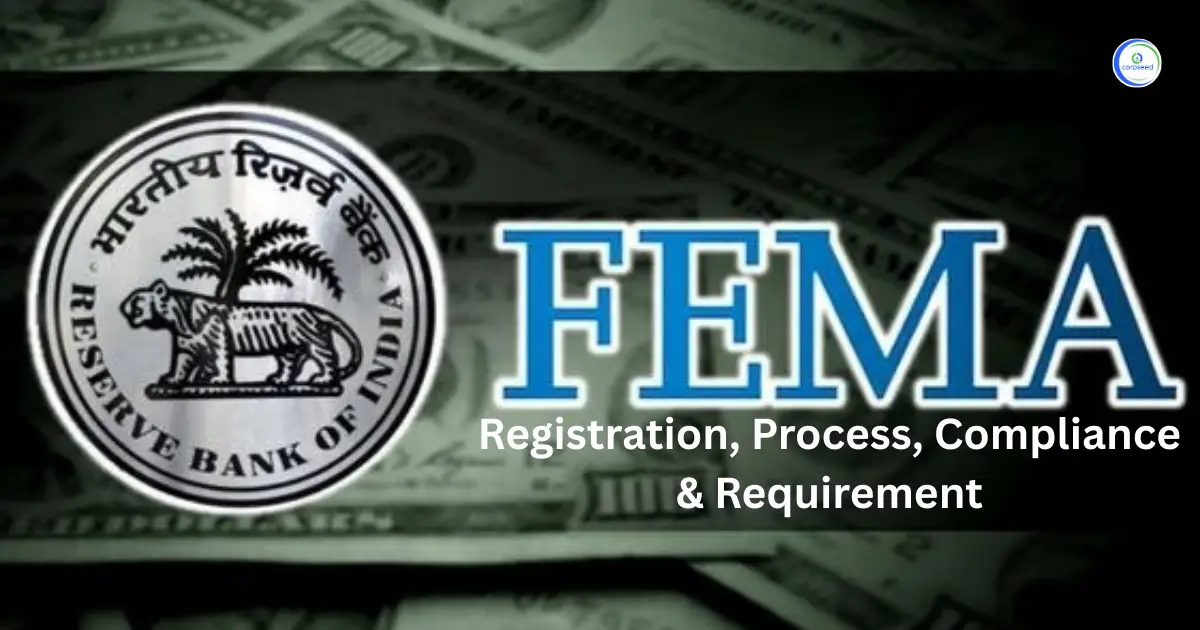Foreign Portfolio Investment (FPI) refers to the purchase of shares, bonds, and other financial assets in a country’s stock market by foreign investors without having direct control over them. As per the Foreign Exchange Management Act (FEMA), 2000, FPI has developed into a major pillar in creating India’s capital markets. It promotes inflows of global funds, boosts market liquidity, and widens investor participation. This strengthens the financial base of the economy and promotes long-term development in India’s real sector.
Table of Contents
- How Foreign Portfolio Investment Benefits The Real Sector of The Economy:
- Eligibility Criteria of Foreign Portfolio Investor:
- Categories of Foreign Portfolio Investment
- Category I: This Shall Include
- Category II: This Shall Include
- Category III: This Shall Include
- Suspension, Cancellation, or Surrender of The Certificate
- A Foreign Portfolio Investor Shall Invest Only in The Following Securities, Namely:
- Conclusion
How Foreign Portfolio Investment Benefits The Real Sector of The Economy:
Foreign Portfolio Investment (FPI) plays a key role in connecting global capital with developing economies. It strengthens financial markets, supports capital formation, and bridges funding gaps between nations. Alongside Foreign Direct Investment (FDI), it helps maintain steady capital inflows that boost liquidity, drive industrial growth, and sustain long-term economic development.
- Boosts Capital Availability: FPI acts as a reliable source of external finance for domestic industries. The funds it brings in allow companies to expand their activities, adopt better technology, and improve production capacity. This flow of money supports business growth and creates new employment opportunities across different sectors.
- Strengthens Financial Markets: Regular inflows of foreign portfolio funds make the financial system more robust. They add depth to the capital market, improve liquidity, and bring stability to asset prices. This healthy flow of capital helps ensure that funds are used efficiently and reach areas where they can generate higher returns.
- Encourages Industrial Growth: With easier access to capital, industries can focus on improving their technology and infrastructure. The additional funding allows them to upgrade machinery, enhance productivity, and compete effectively in both domestic and global markets.
- Promotes Economic Diversification: One of the major advantages of FPI is that it supports a wide range of industries instead of concentrating only on traditional sectors. This helps reduce economic dependency on a few areas and promotes new-age sectors such as renewable energy, digital technology, and advanced manufacturing.
- Improves Market Confidence: Consistent foreign investments reflect global trust in the stability of a nation’s economy. This growing confidence enhances the country’s image in the international market, improves credit ratings, and draws more investors to participate in its development.
- Supports Employment and Income Growth: By strengthening both the industrial and service sectors, FPI indirectly helps generate new jobs and raises income levels. The resulting economic activity contributes to better living standards and supports inclusive development across regions.
Eligibility Criteria of Foreign Portfolio Investor:
If an applicant satisfies the following condition then the designated depository participant shall consider an application for registration as Foreign Portfolio Investor:
- An applicant is a person non-resident in India.
- The applicant is a resident of a country whose securities market regulator is a signatory to an international organization of securities commission’s multilateral memorandum of understanding (appendix signatories) or a signatory to bilateral. Memorandum of understanding with the board.
- The applicant is a bank, is a resident of a country whose central bank is a member of a bank for international settlements.
- The applicant is not resident in a country identified in the public statement of the financial action task force as:
- A jurisdiction having a strategic Anti-money laundering or combating the financing of terrorism deficiencies to which countermeasures apply or
- A jurisdiction that has not made sufficient progress in addressing the deficiencies or has not committed to the action plan developed with the financial action task force to address the deficiencies.
- The applicant is not a non-resident Indian,
- The applicant is legally permitted to invest in the securities outside of the country of its incorporation or establishment or place of business
- The applicant is authorized by MOA or AOA or the agreements to invest on its own behalf of its client.
- The applicant has sufficient experience, a good track record, is professionally competent, financially sound, and has a generally good reputation of fairness and integrity.
- The grant of a certificate to the applicant is in the interest of the development of the securities market,
- The applicant is a fit and proper person based on the criteria specified.
- Any other criteria specified by the board from time to time.
--------------Blog Contact Form-------------
Categories of Foreign Portfolio Investment
Category I: This Shall Include
Government and Government related investors such as central banks, governmental agencies, sovereign wealth funds, and international or multilateral organizations or agencies.
Category II: This Shall Include
- Appropriately regulated broad-based funds such as mutual funds, investment trusts, insurance/reinsurance company
- An appropriately regulated person such as banks, asset management companies, investment managers/advisors, portfolio managers
- Board-based funds that are not appropriately regulated.
- University funds or pension funds
- University-related endowments already registered with SEBI as FIIs or sub-accounts
Category III: This Shall Include
all the others not eligible under categories I and II are foreign portfolio investors such as endowments, charitable societies, charitable trusts, foundations, corporate bodies, trusts, individual and family offices.
Suspension, Cancellation, or Surrender of The Certificate
- Subject to compliance with the provisions of the act, these regulations, and the circulars issued thereunder, the registration granted by the designated depository participant on behalf of the board under these regulations shall be permanent unless suspended or canceled by the board or surrendered by the foreign portfolio investor.
- Suspension and cancellation of registration granted by the board under these regulations shall be dealt with in the manner as provided in chapter V of the securities and exchange board of India (intermediaries) regulation, 2008.
- Any foreign portfolio investor desirous of giving up its activity and surrendering the certificate of registration may make a request for such surrender to the designated depository participant who shall accept the surrender of registration after obtaining approval from the board to do so.
- While accepting the surrender of registration under sub-regulation (3), the designated depository participant may impose such conditions as may be specified by the board and such person shall comply with such conditions.
A Foreign Portfolio Investor Shall Invest Only in The Following Securities, Namely:
- Share, debentures, and warrants of the company listed or to be listed on the recognized stock exchange in India.
- Unit schemes floated by domestic mutual funds, whether listed on the recognized stock exchange of India.
- Units of schemes by the collective investment scheme.
- Derivatives traded on the recognized stock exchange.
- Treasury bill and dated government securities.
- Commercial papers issued by an Indian company.
- Rupee-denominated credit-enhanced bonds.
- Securities receipts issued by assets Reconstruction Company.
- Perpetual debt instruments and debt capital instruments as specified by the Reserve Bank of India.
- Listed and unlisted non-convertible bonds/ debentures issued by an Indian company in the infrastructure sector.
- Non-convertible debentures or bonds issued by a non-banking financial company.
- Indian depository receipt
Such other instruments are specified by the board from time to time.
Conclusion
Foreign Portfolio Investment plays a crucial role in linking financial markets with the real economy. It brings global capital into the country, helping businesses expand, adopt better technology, and generate employment across sectors. With better market liquidity and increased competition, the economy becomes more dynamic and stable in the long-term. At the same time, sound regulation and fiscal discipline are vital to manage risks and prevent sudden market swings. When managed effectively, a strong policy and economic foresight, FPI becomes a driving force for sustainable, inclusive, and steady growth, ensuring that financial inflows lead to real development and lasting economic strength.
Foreign Portfolio Investor Registration
Foreign Portfolio Investor (FPI) registration permits foreign investors to invest in Indian securities, such as shares and bonds, under a structured framework. It guarantees compliance with regulations laid down by the Securities and Exchange Board of India (SEBI).
Foreign Portfolio Investor Compliance
To ensure that one deal with foreign investors per the law, there has to be a system of following local laws governing foreign investments like registration, reporting and tax obligations. It also ensures investment limits and that information is made available as required by the law as well as measures relating to anti-money laundering.
Foreign Direct Investment Approval
The investment that required Government Approval shall file an application via its designated portal for submission of plan and proposal for approval.
This portion of the site is for informational purposes only. The content is not legal advice. The statements and opinions are the expression of author, not corpseed, and have not been evaluated by corpseed for accuracy, completeness, or changes in the law.
BOOK A FREE CONSULTATION
Get help from an experienced legal adviser. Schedule your consultation at a time that works for you and it's absolutely FREE.









